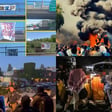
Getting Operational With It: A Discussion with BREACH Digest
We are at a moment of impasse, a time where political spaces and dynamics are shifting drastically. In the past months we have seen military units deploy to streets, the DOJ get used as an overt weapon of the administration, and terrorism laws being openly utilized to suppress anarchist movements. At the same time, there is a distinct sense in which the state, and this current administration, is breaking the state apart while they are trying to consolidate control over it. We are stuck in a race between administrative authoritarianism and the collapse of the American state as we understand it. The result has been a situation that is kinetic rather than definitive, in which the conditions of politics change into terms that are more material and less clear, which differ from place to place, and in which situational awareness becomes paramount for anyone attempting to act directly and effectively.
At times like this it makes sense to do something anarchists have been doing for decades, delving into operational theory. Operational theory is often described as the space that exists between strategy (large-scale movements over time) and tactics (the immediate techniques of fighting). It is a space in which we focus on dynamics, terrains, logistics, in an attempt not to pin an enemy down to simple categories, but to understand ourselves as acting in an environment that shapes those enemies, and ourselves, in very specific hyper-localized ways.
In this discussion we will be sitting down with an editor for the upcoming publication BREACH Digest to talk a little bit about operational theory. We discuss what operational theory is, the history of anarchists studying the operational arts, and some resources that you can get into if you want to dig deeper.
BREACH Digest is a forthcoming publication with a release scheduled in the coming months. To follow their work go to their website, https://breachdigest.noblogs.org/, for more details.
Further Reading
Carl von Clausewitz On War
https://www.gutenberg.org/files/1946/1946-h/1946-h.htm
Antoine-Henri Jomini The Art of War
https://www.gutenberg.org/files/13549/13549-h/13549-h.htm
RAND Corporation on Netwar and Swarming
https://www.rand.org/content/dam/rand/pubs/monograph_reports/MR1382/RAND_MR1382.pdf
https://www.rand.org/pubs/documented_briefings/DB311.html
Institute for the Study of Insurgent Warfare
https://theanarchistlibrary.org/category/author/institute-for-the-study-of-insurgent-warfare
Links to works by Col. John Boyd on organic command and control and the OODA loop
https://www.colonelboyd.com/boydswork
US Military Counterinsurgency Manual
https://irp.fas.org/doddir/army/fm3-24.pdf




